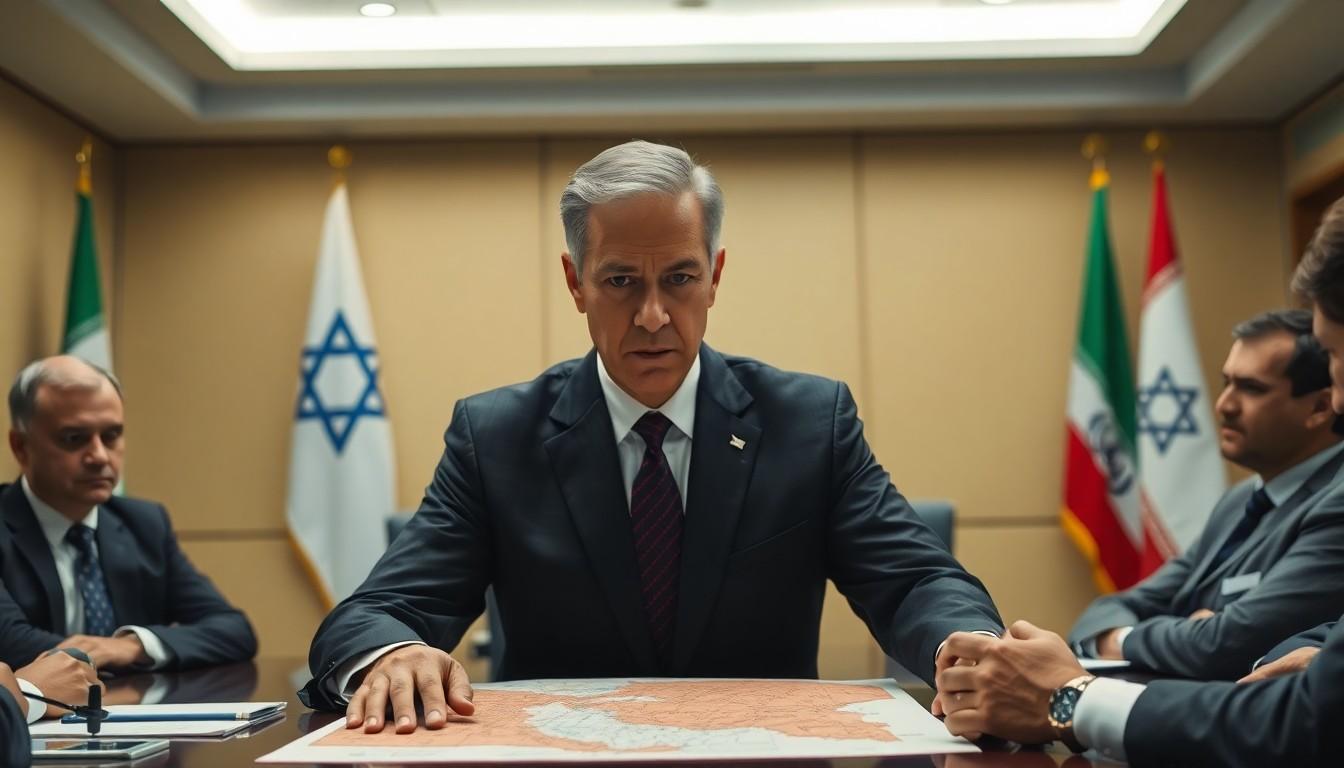In a world where headlines often read like a suspense thriller, the ongoing saga between Iran and Israel never fails to deliver plot twists. From nuclear negotiations to cyber skirmishes, this rivalry is a captivating blend of geopolitics and drama that keeps everyone on the edge of their seats. It’s like watching a high-stakes chess match where each move could spark a global reaction.
But don’t worry, you won’t need a PhD in international relations to keep up. Whether it’s the latest missile tests or diplomatic breakthroughs, the news surrounding these two nations is packed with intrigue and a dash of humor. Buckle up as we dive into the latest developments, revealing the complexities and absurdities of a relationship that’s anything but boring.
Overview of Iran and Israel Relations
Current dynamics between Iran and Israel underscore a tense rivalry influenced by historical grievances and ongoing conflicts. Tensions manifest in various forms, including military posturing, espionage, and public rhetoric. Both nations engage extensively through proxy groups across the Middle East, complicating regional stability.
The nuclear issue plays a critical role in their relationship. Iran’s nuclear ambitions raise alarms in Israel, leading to a steadfast stance against any potential nuclear armament in its neighboring state. Cyber warfare has emerged as another battleground, with both countries exchanging attacks on infrastructure and intelligence networks.
Regional alliances further impact Iran-Israel relations. Israel strengthens its ties with Gulf States while Iran cultivates relationships with groups like Hezbollah and Hamas. These alliances shape policies and provoke responses, adding layers to their long-standing rivalry.
Recent developments reflect this ongoing complexity. Reports indicate increased military cooperation between Israel and Arab nations, driven by shared concerns over Iranian influence. Iran continues to respond assertively, showcasing missile tests and military drills, emphasizing its commitment to defending its sovereignty.
Efforts at diplomacy remain limited. The international community observes these interactions closely, as they present significant implications for global security. Understanding the multifaceted nature of Iran and Israel relations reveals the urgency in monitoring this volatile landscape.
Current Events in Iran

Recent events in Iran reflect significant political changes and economic pressures amid ongoing tensions with Israel. The country’s leadership faces challenges that impact both domestic and international relations.
Political Developments
Iran’s parliament recently approved controversial legislation aimed at tightening control over civil society organizations. Leaders emphasize national security as a top priority, leading to crackdowns on dissent and increasing surveillance. Meanwhile, the government seeks to bolster support from hardline factions, further complicating its political landscape. Repeated calls for increased military spending resonate strongly among officials, highlighting concerns over regional security, particularly with Israel’s expanding alliances. Negotiations surrounding Iran’s nuclear program continue, although progress remains stagnant amid heightened rhetoric from both Tehran and Jerusalem.
Economic Updates
Economic indicators reveal persistent challenges for Iran’s economy, primarily due to international sanctions. Inflation rates have reached over 40%, significantly affecting daily life for citizens. The government aims to improve the economy by enhancing ties with regional partners and seeking new trade agreements, particularly in Asia. Oil exports, once a primary revenue source, face limitations but remain crucial to the economy. As leaders push for domestic production, efforts include boosting agricultural sectors and increasing foreign investment opportunities. Economic resilience strategies become vital as Iran navigates this complex landscape shaped by external pressures and internal demands.
Recent Events in Israel
Recent developments in Israel’s political landscape and security environment highlight ongoing challenges. The situation remains dynamic, with shifts in government policy impacting regional relations.
Government Changes
Israel’s government has experienced significant shifts, particularly with elections that resulted in a coalition realignment. New leadership prioritizes enhanced security measures in response to escalating tensions with Iran. The coalition’s agenda includes strengthening ties with Gulf nations, bolstering intelligence sharing, and increasing military readiness. Recent appointments reflect a strategic push towards a more aggressive posture against perceived threats. Prime Minister Netanyahu’s policies focus on countering Iranian influence in the region, affecting diplomatic relations with neighboring countries.
Security Issues
Security remains a primary concern in Israel, particularly amid rising threats from Iranian proxy groups. The Israel Defense Forces (IDF) routinely conduct operations aimed at neutralizing Iranian operations in Syria and Lebanon. Increased military drills and intelligence activities focus on preparing for potential conflict. Cyber attacks further complicate security protocols, leading to proactive measures within critical infrastructure. Israel’s security agencies emphasize the importance of rapid response capabilities to manage escalations effectively. These comprehensive security efforts aim to deter Iranian aggression and maintain regional stability amidst ongoing tensions.
Impact of Iran and Israel News on Global Politics
Iran and Israel’s ongoing tensions shape geopolitical landscapes significantly. Events in this rivalry often influence political alliances and military strategies worldwide. News surrounding nuclear negotiations directly affects global non-proliferation efforts.
Public rhetoric from Iranian leaders often draws attention from Western nations, heightening concerns over regional security. Military actions, particularly those involving proxy groups, contribute to instability in the Middle East. Alliances like that of Israel with Gulf States directly enhance the security posture against perceived Iranian threats.
Statements from both nations influence international diplomatic negotiations. The UN and other global entities monitor escalation closely, as reactions can ripple through international policy frameworks. Reports of military cooperation between Israel and Arab nations signify a shift in regional dynamics prompted by mutual apprehension towards Iran.
Sanctions imposed on Iran affect global market conditions, particularly in oil and energy sectors. Responses from various countries indicate the complexity of economic strategies intertwined with military concerns. Increased military readiness by Israel signals a proactive approach, aiming to deter potential aggression and reassure allies.
Connectively, developments in one country often trigger reactions in the other, showcasing an intricate web of direct and indirect consequences. Heightened military drills by Israel emphasize the seriousness of the brewing confrontations. News from Iran regarding internal political changes also reverberates through international relations, potentially altering how foreign governments engage with Tehran.
Future Prospects for Iran and Israel Relations
Prospects for Iran and Israel relations remain fraught with uncertainty. Ongoing geopolitical dynamics continue to influence their interactions. Military posturing persists, with both nations bolstering their defenses and capabilities. Tensions surrounding Iran’s nuclear ambitions provoke strong reactions from Israel, prompting continued surveillance and countermeasures.
Collaborative alignments in the region appear to shape future outcomes. Gulf States are increasingly uniting with Israel in response to perceived Iranian threats. Military exercises and intelligence sharing among these allies signal a commitment to collective security. Iran, on its end, solidifies relationships with proxy groups like Hezbollah and Hamas, aiming to maintain its influence across the Middle East.
Economic challenges impact Iran’s strategic decisions. Inflation rates hover above 40%, prompting the government to seek alternative partnerships and trade agreements. Attempts to stabilize the economy may lead to shifts in priorities regarding military spending and external relations. The delicate balance between internal pressure and regional security considerations complicates Iran’s future actions.
Israel’s political landscape is equally dynamic. Recent government shifts prioritize security, particularly against potential conflicts with Iranian proxy groups. Increased intelligence operations and military preparations reflect a readiness to respond quickly to threats. The evolving political environment within Israel emphasizes the need to bolster regional alliances and maintain military superiority.
Despite existing tensions, pathways for dialogue may emerge. The international community continues to encourage negotiations surrounding nuclear issues and regional stability. Current events warrant careful monitoring, as developments in either Iran or Israel often trigger reactions and influence broader geopolitical strategies.
Conclusion
The intricate rivalry between Iran and Israel continues to shape not just regional dynamics but also global politics. As both nations navigate their complex relationship marked by military posturing and economic challenges, the stakes remain high. The evolving alliances in the Middle East and the ongoing nuclear negotiations will play critical roles in determining future interactions.
Ongoing developments in both countries will require close attention. The interplay of military readiness and diplomatic efforts could lead to unexpected shifts in strategy. The international community’s involvement remains crucial in fostering dialogue and encouraging stability in this volatile landscape. Keeping an eye on these unfolding events is essential for understanding their broader implications.

